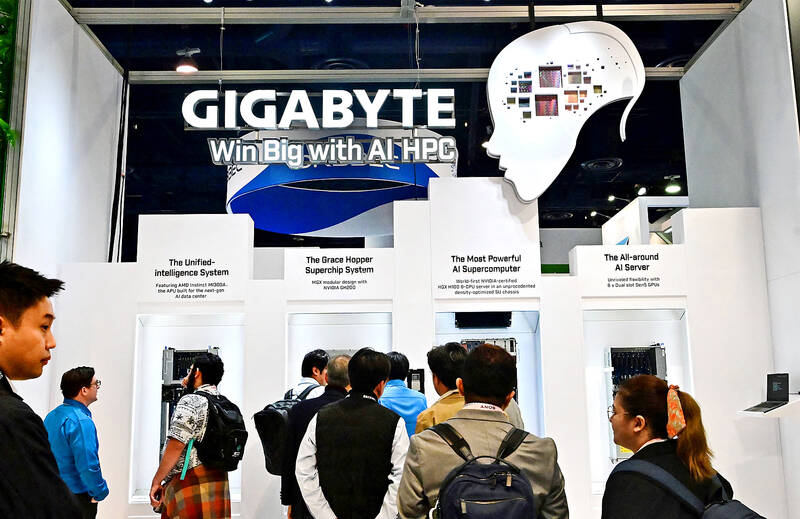Gigabyte Technology Co (技嘉) yesterday reported that its net profit doubled in the first quarter, compared with the same period last year, on the back of strong server shipments.
Weak seasonal demand would affect the company’s sales of consumer electronics-related products such as notebook computers, motherboards and graphics cards this quarter, but continued artificial intelligence (AI) server shipments would support its overall business, Gigabyte said.
It is particularly positive about the second half of the year given consumers’ growing interest in AI products, replacement demand for PCs adopting the new Windows operating system, new product launches by global technology brands, and the sustained AI server growth momentum, Gigabyte said.

Photo by: Frederic J. Brown, AFP
Net profit rose to NT$2.07 billion (US$63 million) from NT$1.02 billion a year earlier in the January-to-March period, as revenue surged to NT$55.16 billion, the company said. That was a 96.8 percent increase from NT$28.03 billion the previous year, mainly due to a mild rise in motherboard sales and a rapid growth in its AI server business.
Earnings per share were NT$3.18, the highest in the past eight quarters, while gross margin fell by 1.35 percentage points to 11.3 percent and operating margin improved by 1.02 percentage points to 5.58 percent, it said.
Sales from servers accounted for 52.5 percent of Gigabyte’s total sales in the first quarter, followed by graphics cards at 27.7 percent, motherboards at 11.6 percent and laptops and other computer peripherals at 8.2 percent, Gigabyte said, adding that AI servers accounted for more than 70 percent of overall server business during the quarter.
Gigabyte said it is striving to provide a wider choice of product lines to meet client demand, with its top 20 customers contributing 80 percent of its overall revenue.
Its main customers are in the US, but has gained growing orders from European and Asia-Pacific regions, mainly cloud service providers, the company said.
Regarding its prospects for server business, Gigabyte said server shipments this year would mainly be those powered by Nvidia H100 and H200 chips.
As for server products adopting Nvidia’s new B100 and GB200 chips, the company would start volume production should it receive the US chip giant’s certification, it said.

When an apartment comes up for rent in Germany’s big cities, hundreds of prospective tenants often queue down the street to view it, but the acute shortage of affordable housing is getting scant attention ahead of today’s snap general election. “Housing is one of the main problems for people, but nobody talks about it, nobody takes it seriously,” said Andreas Ibel, president of Build Europe, an association representing housing developers. Migration and the sluggish economy top the list of voters’ concerns, but analysts say housing policy fails to break through as returns on investment take time to register, making the

‘SILVER LINING’: Although the news caused TSMC to fall on the local market, an analyst said that as tariffs are not set to go into effect until April, there is still time for negotiations US President Donald Trump on Tuesday said that he would likely impose tariffs on semiconductor, automobile and pharmaceutical imports of about 25 percent, with an announcement coming as soon as April 2 in a move that would represent a dramatic widening of the US leader’s trade war. “I probably will tell you that on April 2, but it’ll be in the neighborhood of 25 percent,” Trump told reporters at his Mar-a-Lago club when asked about his plan for auto tariffs. Asked about similar levies on pharmaceutical drugs and semiconductors, the president said that “it’ll be 25 percent and higher, and it’ll

CHIP BOOM: Revenue for the semiconductor industry is set to reach US$1 trillion by 2032, opening up opportunities for the chip pacakging and testing company, it said ASE Technology Holding Co (日月光投控), the world’s largest provider of outsourced semiconductor assembly and test (OSAT) services, yesterday launched a new advanced manufacturing facility in Penang, Malaysia, aiming to meet growing demand for emerging technologies such as generative artificial intelligence (AI) applications. The US$300 million facility is a critical step in expanding ASE’s global footprint, offering an alternative for customers from the US, Europe, Japan, South Korea and China to assemble and test chips outside of Taiwan amid efforts to diversify supply chains. The plant, the company’s fifth in Malaysia, is part of a strategic expansion plan that would more than triple

Taiwanese artificial intelligence (AI) server makers are expected to make major investments in Texas in May after US President Donald Trump’s first 100 days in office and amid his rising tariff threats, Taiwan Electrical and Electronic Manufacturers’ Association (TEEMA, 台灣電子電機公會) chairman Richard Lee (李詩欽) said yesterday. The association led a delegation of seven AI server manufacturers to Washington, as well as the US states of California, Texas and New Mexico, to discuss land and tax issues, as Taiwanese firms speed up their production plans in the US with many of them seeing Texas as their top option for investment, Lee said. The